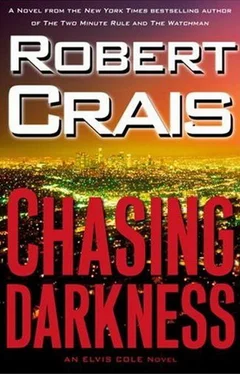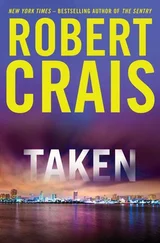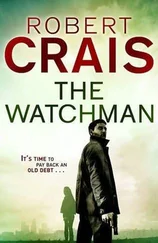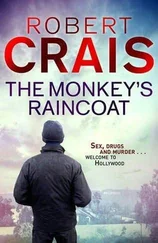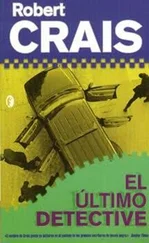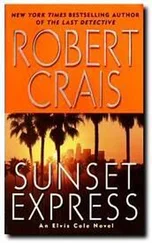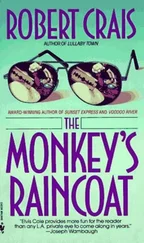Dowling made the bark again.
“Bet your ass he is. Marx was Wilts’s fixer. How do you think Marx got to the top of the glass house?”
The glass house was Parker Center.
“Marx took care of Wilts for years, and Wilts took care of Marx. Guess he still is. Wilts must have brought him in.”
Wilts had been at Marx’s press conference, but I had seen Wilts at dozens of press conferences over the years and thought nothing of it. I had not known their relationship was deeper, or longer, and now a nervous tension grew in my belly. Debra Repko’s final event was a dinner for Nobel Wilts.
“What kind of trouble did Wilts need fixed?”
“Those days, Wilts was a notorious drunk. I’m talking blackouts. He was always getting pulled over or crashing his car. Couple of times he got out of hand with a broad. Whatever. He’d call Marx, and Marx would make it go away. That’s what fixers do.”
“And Wilts returned the favors?”
“Leverage wouldn’t be interested in a stiff like Marx unless he was holding an ace. I’m guessing Wilts brought Marx in as his successor. The old man must be thinking about calling it quits.”
“As simple as that? Wilts tells Leverage Marx is his boy and Leverage takes him aboard?”
“Well, Leverage isn’t doing it because they like his smile. This stuff costs money.”
“So who’s paying the tab? Wilts?”
Dowling made a flicking move with his hand.
“Nah, he probably pressed one of his backers into footing the bill. They make the investment now, they get the favors later. Politics is like Oz, only you never see the magician behind the curtain.”
“Can we find out?”
He thought about it a moment, then checked his watch.
“I’ll have to get back to you. Anything else? Henry has a full day.”
I thought about what he had told me and all that went with it. Marx was no longer just a cop shading an investigation for publicity; now he was a cop who covered up crimes. I wondered how many crimes he had covered, and if Wilts was his only angel.
“One more thing, Mr. Dowling. How far back do Marx and Wilts go?”
“Gotta be fifteen or twenty years. Fifteen, for sure. I can tell you exactly how they got together. I heard it from someone who was there. You do what I do, you hear things, you learn from what you hear.”
He went on without waiting for me to ask.
“Wilts was still a supervisor, before his first run at the seat. Found himself shit-faced at Lenny Branigan’s, but that didn’t stop him from trying to drive. He didn’t make it half a mile. Sideswiped a line of parked cars, just raked right down their sides knocking off the mirrors, and ended up on the sidewalk. When he came to, Marx was wiping the blood from his face, had to be about three in the morning. Marx wasn’t even on duty that night, just happening by, and one thing led to another. Marx drove Nobel home, then brought his car to a boy in Glendale who worked fast for cash. I’ve used him myself. You know who told me this story?”
I shook my head.
“Wilts. Wilts said, you need a boy you can trust, you call this boy Marx. He was looking out for Marx even then, figuring I’d use him.”
“Did you?”
Dowling smiled.
“I have my own fixers.”
Dowling glanced at his watch again.
“Anything else?”
“No, sir. I guess that’s it.”
“Okay. You talk to Frank, tell him Chip Dowling sends his respects.”
“Yes, sir. I will.”
I thought of a final question when I reached the door.
“One more thing-”
He nodded.
“What’s the worst thing Marx ever fixed?”
“I don’t know the worst thing he fixed. All I know is the worst I’ve heard about.”
I let myself out.
I SAT in my car in the strip mall parking lot, watching the women come and go without seeing them. The heat was suffocating. It baked down from the sky and bounced up from the parking lot and soaked into the car until the car became part of the oven. The heat came from all sides, and didn’t let up, but I still did not move. I didn’t like what I had learned from Dowling or what those things led me to think.
The manila envelope with the articles and files I had collected was behind the passenger seat. I fingered through the printouts until I found the one I wanted, and reread it.
Marx had investigated the murder of the first victim, Sondra Frostokovich, almost seven years ago. Described as an administrator for the city, her body had been found by workmen in an empty building on Temple Street, four blocks from where she worked in the city administration building. She was twenty-four years old, and had been strangled to death with an extension cord. Lindo had pointed out the blood dripping from her nose in the death album Polaroid. Three drops that, when compared to the coroner investigator’s crime scene pictures, established the Polaroid had been taken within moments of her death. When I closed my eyes, the frozen image returned to life, and the red pool continued to grow.
The short article provided no personal information of any kind. No family members, spouse, or children were mentioned, nor was a place of birth or school affiliation. The article ended with the plea from Marx for anyone with knowledge of the crime to come forward. He had almost certainly worked the case with a partner, but the only officer identified was Detective-Sergeant Thomas Marx of Central Bureau Homicide.
It was a long road from sergeant to deputy chief, and Marx had traveled that road in only seven years.
I dialed Information and asked for any listing in any city area code for Frostokovich. It took a moment, but the operator found five listings scattered over three area codes-two male, one female, and two showing only initials. Good thing Sondra wasn’t a Jones or Hernandez.
I called Edward Frostokovich first, but got no answer, not even a message machine.
Grady Frostokovich was my second call. He answered on the fourth ring, sounding young and polite. I identified myself, and asked if he knew of or had been related to a Sondra Frostokovich.
He said, “The one who was murdered?”
“That’s right. I’m sorry to disturb you like this.”
“Hey, no worries, I barely knew her. They found the guy. All this time later, they got him. How cool is that?”
“I’m looking into the original investigation back at the time of her murder. Think you could help with that?”
“Well, I would if I could, but she was my cousin, you know? Our family isn’t the closest family in the world.”
“Was Sondra from here in L.A.?”
“Oh, yeah. They lived in Reseda.”
“Are her parents or sibs still here?”
“That’s my Aunt Ida. Uncle Ronnie died, but her mom was Aunt Ida. You should talk to Aunt Ida.”
There was an I. L. Frostokovich on my list.
“Is that I. L. Frostokovich?”
“Yeah, that’s her. She’s really nice. My mom hates her, but she’s really nice.”
Grady was right. Ida was nice. I explained I was working with the family of the seventh and final victim, Debra Repko, and asked if she would be willing to tell me about her daughter. Five minutes later I was heading for Reseda.
IDA FROSTOKOVICH lived in a small tract home in the center of the San Fernando Valley, north of the Los Angeles River and fifteen degrees hotter than the basin side of the city. When Ida was a child, orange groves covered the valley floor as far as she could see with Zen perfection-identical rows of identical trees, each tree identically distant from its neighbors; row after row of low green clouds heavy with orange balls that smelled of sunshine. She remembered those times, and thought often of the trees, but during the boom years after the Second World War, the groves were bulldozed and the trees replaced by row after row of small, low-cost houses. Most of the houses were much the same in size and shape as the thousands of other houses there on the valley floor, but none of them smelled like sunshine.
Читать дальше
